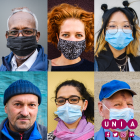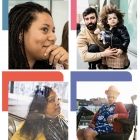Agreement between the Interfederal Centre for Equal Opportunities and the federal police: Annual Report 2014
The federal police and the Centre for Equal Opportunities have been working together closely since 1996 in order to bring this ambition to fruition and fully integrate diversity in the existing processes within the police. This partnership is governed by an agreement between the Belgian minister of the interior and the Centre. This creates a clear framework in which the police and the Centre can continue to work in partnership to fight discrimination, hate speech and hate messages.
Insofar as this agreement is unlimited in time, it also allows them to elaborate a multi-year vision together for joint actions.
A collaboration based on three pillars
Within the framework of this partnership, the Centre and the police have chosen a multifaceted and integrated approach aimed at taking long-lasting, structural action in favour of greater diversity. The current partnership is based on three essential pillars which are complementary, with each bringing an added value to the collaboration:
- Diversity training
- Support for the integrated police’s Community of Practice Diversity;
- Support for structural diversity management projects.
These three pillars are the subject of specific comments in Chapter 2 of this Annual Report, ‘Activities within the partnership’s framework’. In Chapter 1, ‘Ethical competences in the fight against discrimination and racism’, we have firmly opted for another approach this year: to analyse in greater depth a certain number of horizontal observations within the framework of the collaboration between the police and the Centre, based on both external and internal contributions. Besides the diversity training pillar, we have fully focused on implementing structural projects over the past few years. This has allowed us to pinpoint obstacles and structural challenges within the police organisation. We therefore hope to provide an initial boost to modify processes, if necessary, and initiate a policy likely to truly integrate diversity within the police force.
You can download the Annual Report 2014 below. We hope you enjoy reading it.
Downloads
Comparable publications
Annual report 2020: vulnerable human rights in times of crisis

In this extraordinary year, Unia continued to fight for human rights and equality. The corona pandemic acted like a magnifying glass. Those already in a vulnerable position were often the first or hardest hit by Covid-19 or its measures.
Evaluation of federal anti-discrimination legislation (2017)
Article 52 of the Anti-Discrimination Law states that the application and effectiveness of the anti-discrimination laws must be assessed by the Legislative Chambers. Unia has prepared an assessment report on the Anti-Discrimination Law and the Anti-Racism Law based on its own practical experience, national jurisprudence and its general expertise in the fight against discrimination.
Annual report 2022

In 2022, Unia continued to fight on behalf of discriminated citizens. In our annual report, we look back at our efforts to combat discrimination and promote equality in Belgium.
Parallel report to the Committee for the Elimination of Discrimination against Women (CEDAW) (2022)
Did you know that 86% of family caregivers of people with disabilities are women? That the employment rate of women of foreign backgrounds is still lower than that of men, that they are more often employed in part-time jobs, with lower wages or in specific employment sectors, such as domestic help?
